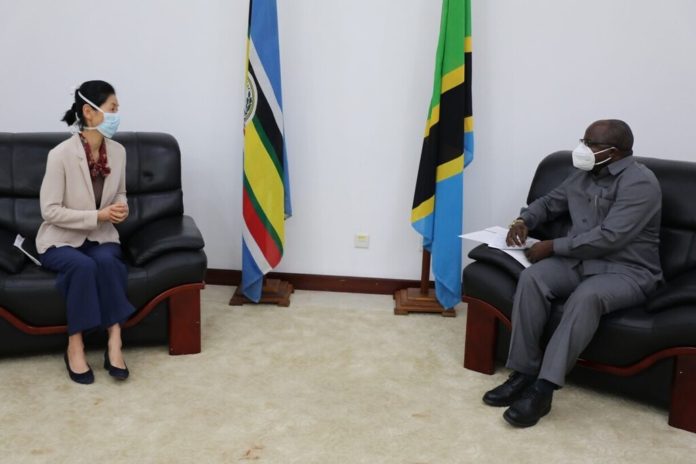Dar es Salaam, May 28 — Tanzania government on Tuesday this week summoned the acting U.S Ambassador, Inmi Patterson, to vent off its frustration over the embassy’s health advisories, which imply an increase of COVID-19 cases in the country.
In a series of rambling media statements, the U.S Department of State has repeatedly warned American citizens about “extremely high risk” of contracting COVID-19 in Tanzania’s largest commercial city, Dar es Salaam and other places.
The East African country has since April 29 stopped releasing new statistics on COVID-19 data after the government suspected possible sabotage to tarnish the image of the country.
In its recent health advisory, the U. S Embassy claimed there’s an exponential growth of Coronavirus cases in Dar es Salaam, adding that hospitals are overwhelmed with the COVID-19 patients.
However, during his meeting with the U.S top diplomat, the permanent secretary of Tanzania’s Ministry of Foreign Affairs and East Africa Cooperation, Wilbert Ibuge refuted the embassy’s claims saying they are misleading and likely to cause unnecessary distress to Tanzanian citizens and people wishing to visit the country.
Secretary Ibuge reminded the U.S diplomat on the importance of providing accurate, verified, and factual information from trusted sources.
This is not the first time the U.S Embassy provoked Tanzania. In June last year, it issued a travel advisory, warning an imminent terror attack that never happened.
Despite official secrecy on the status of the Coronavirus pandemic, the U.S embassy warned about exponential growth of COVID-19 cases, claiming hospitals in Tanzania’s largest city were overwhelmed with Coronavirus patients.
Data compiled by John Hopkins University, indicate that Tanzania has recorded 509 COVID-19 cases, including 21 deaths and 183 recoveries.
Unlike Kenya and Uganda, Tanzania did not impose lockdown but asked citizens to maintain social distance, wear facial masks and wash their hands
In a surprising move, the Dar es Salaam Regional Commissioner, Paul Makonda, last week declared victory over the Coronavirus—urging city residents to hold parties with loud music to cherish “God’s victory” against the virus.
“I call upon city residents to celebrate God’s victory, play loud music as much as you can,” the Regional commissioner said. President John Magufuli echoed the God factor in the fight against the Coronavirus.
Attending Sunday service at a chapel near his hometown recently, President Magufuli said: “There’s nothing like lockdown in Tanzania, God will help us,” amid cheers from a packed congregation.
Meanwhile, the president announced that Universities will reopen effectively June 1, adding that the situation is coming to normal due to substantial decline of COVID-19 cases.
The East African country has also lifted travel restrictions imposed on passenger flights to allow airlines and tourism business to return to normal.
The U.S Embassy’s health alerts came after growing rumors about suspected hidden deaths in Tanzania where amateur videos showed a number of mysterious nocturnal burials by mask-wearing officials.
As nations across East Africa administer testing and enforcing lockdowns, Tanzania has taken a series of counterintuitive steps in response to the crisis.
With no official lockdown imposed, businesses still open, and citizens continuing to stream in churches and mosques, observers say the number of people affected could be higher.
Tanzania’s response to COVID-19 has been characterized by conspiracy theories, tight control of information, and aversion to science.
In his most baffling response to the pandemic, President Magufuli, in early May announced that the Coronavirus data was inflated due to compromised test kits that resulted in false positives attributed to potential sabotage by imperialists.
When non-human samples including pawpaw and goat, tested positives, the president cast doubt on the test kits and the laboratory technologists.
Although the World Health Organisation (WHO) rejected the government narrative about defective test kits, the president ignored scientific reasons and embraced religious devotion and natural remedies as cure for the virus.
Observers say the country’s botched response to COVID-19 has significant health, economic and political consequences for the country and the rest of the region.
“High rates of transmission, coupled with the failure to implement containment strategy, will almost certainly fuel unexplained deaths,” said Elisha Osati, President of Tanzania Medical Association.
The United States and Tanzania, have for many decades been enjoying cordial diplomatic ties.
The existing partnership is characterized by mutual respect and aspirations for a peaceful and prosperous future.
The United States, through numerous presidential initiatives and U.S. agencies, has provided development assistance to Tanzania for capacity building to address health and education issues, encourage democratic governance, promote economic growth, and advance regional and domestic security.

